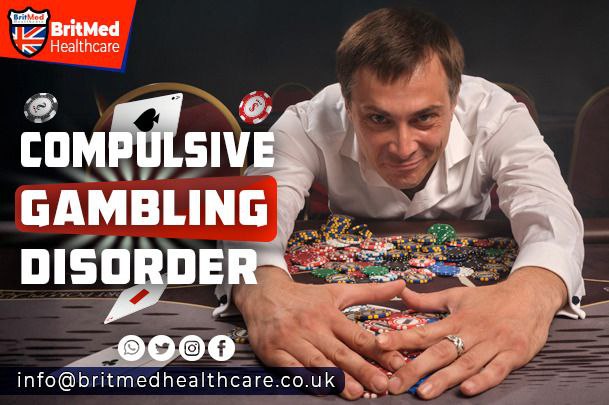Compulsive Gambling Disorder: An Ever- Increasing Problem in the UK
During the past couple of decades, a notable increase in compulsive gambling disorder has taken place in the UK, a very serious problem which affects the fate not only of individual people but also of society as a whole. This article will attempt to give an all-round view of compulsive gambling disorder, its symptoms, causes, and treatment options, and also point out the importance of taking this issue seriously.
What is Compulsive Gambling Disorder?
Compulsive gambling disorder, also called pathological gambling, is a mental health condition that represents an irresistible urge to gamble even when it often leads to serious financial, social, and emotional problems. This is a chronic progressive illness that can bring disastrous consequences for the individual and family.
Symptoms of Compulsive Gambling Disorder
Following is some of the symptoms of compulsive gambling disorder.
preoccupation with the urge to gamble: thinking about gambling much of the time and preoccupation with the need to gamble because an individual needs to feel the ‘rush’ associated with gambling. Tolerance: the individual is forced to continually increase the amount of money gambled, or the frequency gambled, in order to achieve the excitement levels desired. Loss of control: gambles more than intended and cannot cut down or control gambling, despite excessive spending occurring. Withdrawal: restlessness or irritability when unable to gamble. Tolerance: has made repeated unsuccessful efforts to cut down or stop gambling.
Escape: gambling as an escape from problems or negative emotions
Causes of Compulsive Gambling Disorder
Specific causes of compulsive gambling disorder are not fully known, but studies have indicated that it is caused by the combination of genetic, environmental and psychological factors. These include:
-Family history: one is more likely to develop compulsive gambling disorder if there has been a history of problems with gambling within the family members or relatives
-Trauma: Individuals who have been through traumatic experiences are at a high risk of having compulsive gambling disorders.
-Stress and anxiety: Those that gamble as a way to mitigate stress or anxiety are at a risk of acquiring compulsive gambling disorder.
-Brain Chemistry – Neurotransmitters like dopamine and serotonin may generate an imbalance that could consequently affect the development of the compulsive gambling disorder. Consequences of Compulsive Gambling Disorder
Compulsive gambling disorder is a serious condition that can lead to major consequences for the individual affected and also society in general. These may range from:
-Financial issues: debt, bankruptcy, and financial strain
-Social issues: relationship breakdowns, social isolation, and loss of friendships
-Mental health issues: depression, anxiety, and substance abuse
-Legal issues: criminal charges for fraud, theft, or other unlawful activities
Treatment Options for Compulsive Gambling Disorder
Fortunately, there are a number of effective treatment options available for individuals with compulsive gambling disorder. These may include:
-Cognitive-behavioral therapy: this is helpful in making people identify and change negative thought patterns and behaviors.
– Behavioral therapy: this allows the person to learn new ways of coping and collecting skills to handle cravings.
-Medications: antidepressants and anti-anxiety drugs might be prescribed to handle such symptoms.
-Support groups: A support group can make a person feel part of a community and help them stay on track with recovery.
Conclusion
Compulsive gambling disorder is a serious mental health condition, and the consequences can reach so far as to individual and society in general. For that, effective treatment options, together with raised awareness and education about the condition, are absolutely crucial in helping individuals recover from compulsive gambling disorder and go on to live healthier, more fulfilling lives.
References:
Compulsive gambling – Symptoms & causes – Mayo Clinic
Websites:
Britmed Healthcare: https://britmedhealthcare.co.uk/
Nightingale Hospital: https://www.nightingalehospital.co.uk/
You can also book on Top Doctors UK Contact us on WhatsApp 08009708017
Top Doctors: https://www.topdoctors.co.uk/doctor/ahmed-el-missiry




